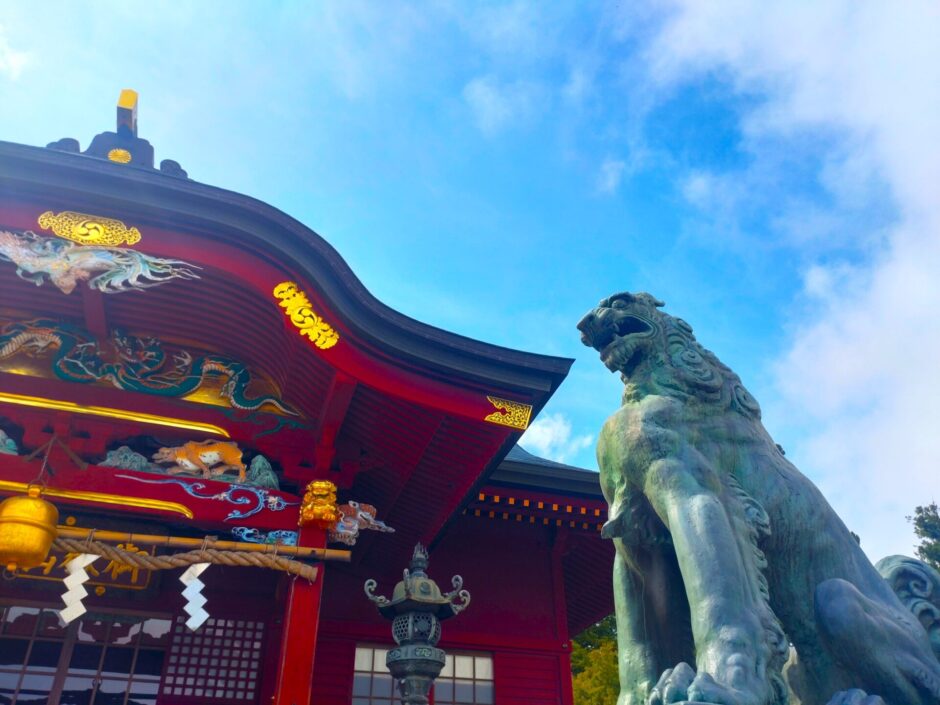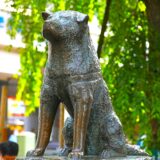【Musashi Mitake Shrine summary】
Musashi Mitake Shrine is an ancient shrine built in 90 B.C. during the reign of Emperor Sojin, located 929 meters above sea level at the top of Mt. It is said that Zao Gongen was invoked by Gyoki in 736 (Tempyo 8). Zao Gongen is the Buddha of Shugendo, a unique Japanese mountain Buddhism that does not originate in India. In 1234, Kunikane Ohnakaomi rebuilt the shrine, which had fallen into disrepair, and since then it has been known as a place of ascetic practices, with many armaments dedicated to it by the samurai government and warriors of the Kanto region. The head shrine was built in 1605 with Okubo Nagayasu as the chief contractor.
【Musashi Mitake Shrine cable car】
![Musashi Mitake Shrine [Tokyo] DSC 0405 1 1024x768 - Musashi Mitake Shrine [Tokyo]](https://japan-shrine.info/wp-content/uploads/DSC_0405-1-1024x768.jpg)
From Takimoto Station (parking available), take the cable car for about 15 minutes to Mitakesan Station.
![Musashi Mitake Shrine [Tokyo] DSC 0462 1 1024x768 - Musashi Mitake Shrine [Tokyo]](https://japan-shrine.info/wp-content/uploads/DSC_0462-1-1024x768.jpg)
After a short walk from Mitakesan Station, you will see a red torii gate. From here it will be a 20-30 minute walk to the village. You will enjoy the wonderful view of the mountain as you walk to the village.
【Musashi Mitake Shrine village of monks staying at a temple or shrine】
![Musashi Mitake Shrine [Tokyo] DSC 0454 2 1024x768 - Musashi Mitake Shrine [Tokyo]](https://japan-shrine.info/wp-content/uploads/DSC_0454-2-1024x768.jpg)
On the way to the shrine, as many as 30 shukubo (lodging houses) still stand side by side. There are also teahouses and stores where visitors can enjoy soba (buckwheat noodles), sweets, and a variety of souvenirs.
![Musashi Mitake Shrine [Tokyo] DSC 0413 1024x768 - Musashi Mitake Shrine [Tokyo]](https://japan-shrine.info/wp-content/uploads/DSC_0413-1024x768.jpg)
As you proceed through the retro Showa-era atmosphere of the restaurant, you will see the third torii (gateway).
【Musashi Mitake Shrine precincts】
![Musashi Mitake Shrine [Tokyo] DSC 0415 2 1024x768 - Musashi Mitake Shrine [Tokyo]](https://japan-shrine.info/wp-content/uploads/DSC_0415-2-1024x768.jpg)
The third torii gate and Zuijimon Gate can be seen in front of you. If you are a first-time visitor, you may think that you are at a shrine as soon as you climb the stairs and pass through the gate, but you will have to climb more stairs from here. However, you will have to take a break on the way up and climb the stairs slowly.
![Musashi Mitake Shrine [Tokyo] DSC 1120 160x160 - Musashi Mitake Shrine [Tokyo]](https://japan-shrine.info/wp-content/uploads/DSC_1120-160x160.jpg) Konpira Shrine [Kagawa]
Konpira Shrine [Kagawa]
![Musashi Mitake Shrine [Tokyo] DSC 0420 1024x768 - Musashi Mitake Shrine [Tokyo]](https://japan-shrine.info/wp-content/uploads/DSC_0420-1024x768.jpg)
There are approximately 250 stone steps from Zuijimon Gate. Along the way, there are many stone monuments commemorating the lecture and the people who contributed to the temple. The main shrine is located at the top of these steps.
![Musashi Mitake Shrine [Tokyo] DSC 0423 1 1024x768 - Musashi Mitake Shrine [Tokyo]](https://japan-shrine.info/wp-content/uploads/DSC_0423-1-1024x768.jpg)
The main shrine is Shinmei-zukuri. The Gongen-zukuri hall of worship and the hall of offerings stand. Shinjin is enshrined at Musashi Ontake Shrine. Shinjin is a different name for a wolf, meaning “true god” or “righteous god.
![Musashi Mitake Shrine [Tokyo] DSC 0445 3 1024x768 - Musashi Mitake Shrine [Tokyo]](https://japan-shrine.info/wp-content/uploads/DSC_0445-3-1024x768.jpg)
In the Treasure Hall, there are two national treasures, including a large armor of red thread veil, and many other valuable items such as armor and swords that are important cultural properties. Please stop by.
![Musashi Mitake Shrine [Tokyo] DSC 0430 1 1024x768 - Musashi Mitake Shrine [Tokyo]](https://japan-shrine.info/wp-content/uploads/DSC_0430-1-1024x768.jpg)
At the back of the main shrine there are various branch shrines and the Okumiya Haruwari-sho.
![Musashi Mitake Shrine [Tokyo] DSC 0435 1024x768 - Musashi Mitake Shrine [Tokyo]](https://japan-shrine.info/wp-content/uploads/DSC_0435-1024x768.jpg)
The former main shrine, Jouban Katabansha Shaden, was built in 1511 and is a Tangible Cultural Property designated by the Tokyo Metropolitan Government.
![Musashi Mitake Shrine [Tokyo] DSC 0427 2 1024x768 - Musashi Mitake Shrine [Tokyo]](https://japan-shrine.info/wp-content/uploads/DSC_0427-2-1024x768.jpg)
Standing at the top of the mountain with a great view, we were able to worship in peace and quiet.
【Musashi Mitake Shrine GOSHUIN】
![Musashi Mitake Shrine [Tokyo] musashimitakejinja letter 682x1024 - Musashi Mitake Shrine [Tokyo]](https://japan-shrine.info/wp-content/uploads/musashimitakejinja-letter-682x1024.jpg)
Musashi Ontake Shrine red seal ink writing in red ink 500 yen (2023)
【Musashi Mitake Shrine Access】
Manager’s Comments
Although it takes quite a long time to reach this area, even though it is located in Tokyo, it has the atmosphere of a hidden village and is enjoyable to visit. The air is clean and you can fully enjoy the atmosphere of Okutama by slowly climbing up the mountain while enjoying the scenery of the village. I have visited the shrine many times, but each time I feel like I make new discoveries.
 Tour of Japanese shrines and temples
Tour of Japanese shrines and temples 

![Musashi Mitake Shrine [Tokyo] DSC 0545 150x150 - Musashi Mitake Shrine [Tokyo]](https://japan-shrine.info/wp-content/uploads/DSC_0545-150x150.jpg)
![Musashi Mitake Shrine [Tokyo] DSC 2266 1 150x150 - Musashi Mitake Shrine [Tokyo]](https://japan-shrine.info/wp-content/uploads/DSC_2266-1-150x150.jpg)
![Musashi Mitake Shrine [Tokyo] 20260125 133353892 2 150x150 - Musashi Mitake Shrine [Tokyo]](https://japan-shrine.info/wp-content/uploads/20260125_133353892-2-150x150.jpg)
![Musashi Mitake Shrine [Tokyo] DSC 0566 150x150 - Musashi Mitake Shrine [Tokyo]](https://japan-shrine.info/wp-content/uploads/DSC_0566-150x150.jpg)

